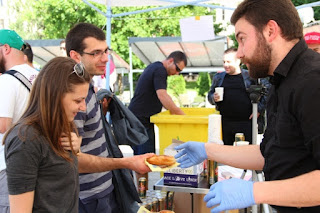BULGARIANS CELEBRATE TAX FREEDOM DAY… 136 DAYS INTO THE YEAR
In 2011, Bulgarian citizens had to work 115 days before being able to pay off their taxes. This year, that number jumped to 136 days (May 16). Hundreds of Bulgarian taxpayers turned out for an event celebrating this year’s Tax Freedom Day. Celebrated in countries around the world, Tax Freedom Day marks the day that citizens have earned enough to pay off their taxes and start earning for themselves.
The Bulgarian Libertarian Society (BLS), along with the Institute for Market Economics, both Atlas Network partners, hosted the country’s largest ever Tax Freedom Day event in Sofia, Bulgaria, on May 16. The outdoor event, attended by more than 400 people, was held in Sofia’s central City Garden, on the ruins of the socialist mausoleum of Georgi Dimitrov.
The Society sought to “make this a ‘popular’ holiday, something more imaginative and captivating a wider range of people.” The end result was a beer festival that showed attendees just how much of their money the government is taking, and when they really start keeping what they earn.
Attendees enjoyed the open event’s free beer and snacks, proclaiming that “taxation is theft!” in front of a camera.
They also participated in games such as a weightlifting competition where some weights were “taxed,” making them heavier than their normal weight.
Miss World Bulgaria 2016 (Galina Mihaylova), who attended the event, stated that “I believe that the Tax Freedom Day was the most educational event in Bulgaria on how taxation works and why high taxes are an infringement of everyone’s personal freedom and development.”
The event attracted a substantial amount of media attention. More than 40 media outlets covered the event and interviewed Panchev regarding the Society’s recommendations and goals. Reporting on the event was also featured in the evening news of the two biggest television channels in the country, BTV and NOVA TV.
“We opened up a conversation on the size of government and the morality of taxation. … Most people are not aware how much of their income goes to the state coffers and we started talking about this, telling them that they are losing 40 to 50 percent of their money,” Panchev said. “The best would be if we celebrated this holiday in January rather than in May.”






Comments
Post a Comment